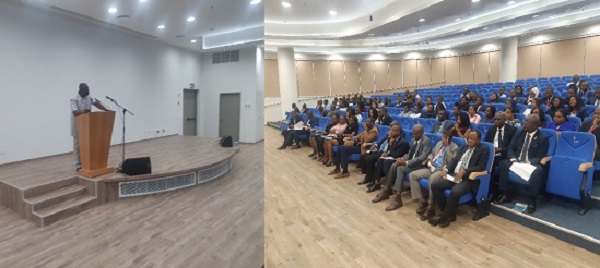Lawrence Agyinsam (Left) addressing staff of EXIM Bank
Ghana EXIM Bank, the leading export financing and development bank in Ghana, has indicated that it will construct 100 green houses across the country under its “Youth In Green House Enterprise Project (YUGEP).
This is aimed at promoting investment in greenhouse vegetable production, reducing the huge and persistent importation of vegetables and creating employment in the economy.
The move is also an import-substitution strategy to increase the production of vegetables in Ghana.
Chief Executive Officer (CEO) of the bank, Lawrence Agyinsam, said this when he addressed a staff durbar of the bank in Accra recently to outline the bank’s 2019 strategic vision and programmes for the year.
For a start, six regions, namely, Greater Accra, Ashanti, Central, Western, Volta and Eastern Regions are being examined due to vegetation and ecological considerations, adding that all the necessary stakeholder consultations had been carried out and necessary procurement process initiated to ensure that the project commences soon.
“It’s estimated that about $100 million is spent on vegetable importation into Ghana, and this initiative is to help reduce drastically this volume, save foreign exchange and create rural employment in the country,” he declared.
Mr. Agyinsam disclosed that the bank, in collaboration with the 1D1F Secretariat, would finance 100 community-based industries with an amount of GHS70 million to boost rural industrialization and stem the urban-rural drift, as well as create the needed employment at the local level.
“Apart from that we will also establish five LEGACY Projects, including the construction of a jute factory in Kumasi in the Ashanti Region, he added.
He, therefore, charged the staff to brace themselves for an action-declared year and contribute their quota to the achievement of “Ghana Beyond Aid” programme.
Ghana Export-Import Bank (GEXIM) was established by an Act of Parliament 2016 (Act 911) to support and develop directly or indirectly trade between Ghana and other countries and also build Ghana’s capacity and competitiveness in the international market.L


